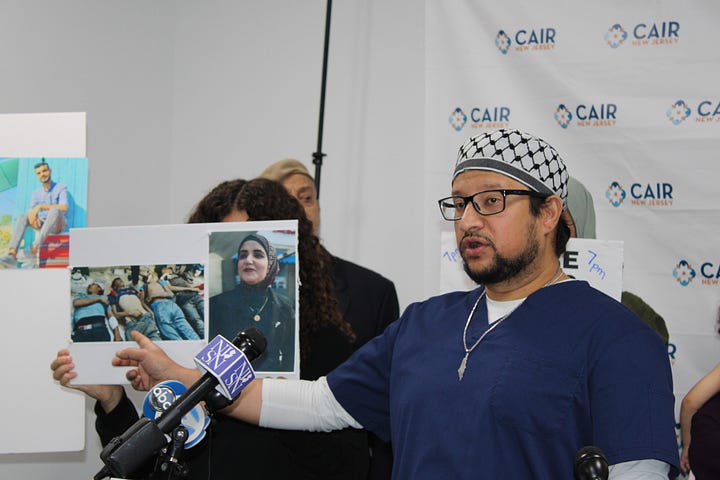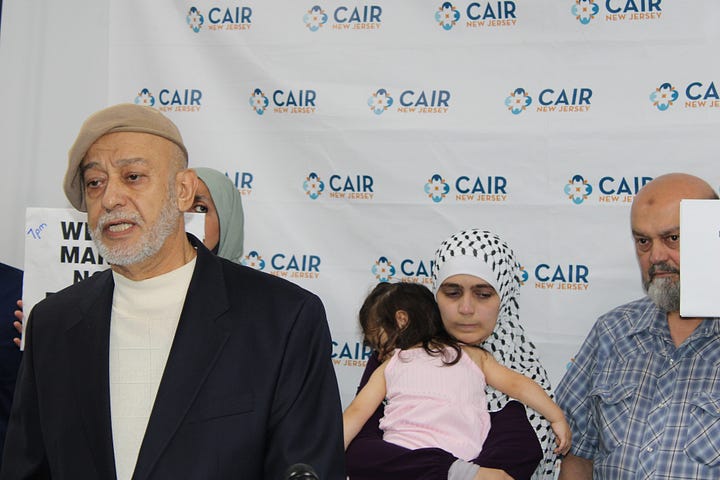New Jersey Palestinian Families Demand U.S. Action as Gaza Starvation Crisis Deepens
CAIR-NJ Hosts Emotional Press Conference Calling for Immediate American Intervention to Stop "Deliberate Starvation" Campaign


Palestinian-American families in New Jersey, many with relatives trapped in Gaza, joined the Council on American-Islamic Relations New Jersey chapter on Wednesday in an emotional appeal for immediate U.S. government intervention to halt what they characterized as Israel's "deliberate starvation" campaign against Gaza's 2.3 million residents. Speaking at a press conference in Paterson, the families described agonizing separation from loved ones who face severe malnutrition and death, while calling on American officials to use diplomatic and economic pressure to ensure unimpeded humanitarian access to the besieged territory.
The urgent appeal comes as international health organizations report 127 confirmed deaths from starvation in Gaza, with 85 of those victims being children, and as UN agencies warn of "catastrophic hunger" spreading throughout the territory after nearly 22 months of conflict.
"We wake up every morning not knowing if our family members are still alive. The deliberate starvation of our people is a war crime, and the United States must act immediately to stop this genocide."
— Palestinian-American family member at CAIR-NJ press conference
Families Share Personal Tragedy of Starvation Crisis
During Wednesday's press conference, several Palestinian families shared harrowing accounts of relatives suffering from malnutrition and the inability to access basic necessities in Gaza. The families, whose identities were partially protected for their safety, described watching helplessly as loved ones deteriorated from lack of food and medical care.
"We wake up every morning not knowing if our family members are still alive," said one family member whose relatives remain trapped in northern Gaza, according to CAIR-NJ's statement. "The deliberate starvation of our people is a war crime, and the United States must act immediately to stop this genocide."
The families specifically highlighted the targeting of aid distribution sites and the systematic obstruction of humanitarian convoys as evidence of intentional starvation tactics. According to recent UN reports, more than 1,000 people have been killed and over 7,000 injured since late May while attempting to access food aid in Gaza.
"What we are witnessing in Gaza is the deliberate use of starvation as a weapon of war, which constitutes a war crime under international law."
— Selaedin Maksut, CAIR-NJ Executive Director
"Forced Starvation as a Weapon of War"
CAIR-NJ Executive Director Selaedin Maksut condemned what the organization characterizes as the weaponization of hunger against Palestinian civilians. "What we are witnessing in Gaza is the deliberate use of starvation as a weapon of war, which constitutes a war crime under international law," Maksut declared during the press conference.
The civil rights organization cited recent reports from the World Health Organization indicating that of the 74 malnutrition-related deaths recorded this year, 63 occurred in July alone, representing what WHO called a "dangerous trajectory" in the humanitarian crisis.
CAIR-NJ emphasized that Palestinian families in New Jersey are experiencing trauma not only from the loss of relatives but from the knowledge that their tax dollars are supporting military aid to Israel. "These families are forced to watch their government enable the very policies that are killing their loved ones," Maksut stated.
"These families are forced to watch their government enable the very policies that are killing their loved ones."
— CAIR-NJ statement on U.S. military aid
Catastrophic Hunger Documented
The families' appeal aligns with mounting international concern over Gaza's humanitarian crisis. The UN Office for the Coordination of Humanitarian Affairs reported this week that "the entire population of over 2 million people in Gaza is severely food insecure," with one-third having gone days without food and 80% of starvation deaths affecting children.
UN Emergency Relief Coordinator Tom Fletcher welcomed Israel's recent announcement of limited humanitarian pauses but emphasized that "vast amounts of aid are needed to stave off famine and a catastrophic health crisis." Fletcher stressed that "ultimately, we don't just need a pause. We need a permanent ceasefire."
The World Food Programme noted that nearly half a million people face famine-like conditions, while UNICEF reported that children are "trapped in a nightmare and deprived of the basics to survive" since the collapse of the ceasefire in March.
Medical Crisis Beyond Malnutrition
Health organizations have documented that the crisis extends beyond direct starvation to encompass the collapse of Gaza's medical infrastructure. The World Health Organization reported that Gaza's four specialized malnutrition treatment centers are "overwhelmed, running low on fuel and supplies, and staffed by exhausted health workers."
Over 5,000 children were treated for malnutrition in July alone, many with life-threatening forms of the condition. WHO emphasized that "this crisis is entirely preventable," citing deliberate obstruction of aid as the primary cause of the mounting death toll.
The families at Wednesday's press conference specifically mentioned relatives who have died not from direct violence but from preventable diseases and malnutrition-related complications, highlighting how the broader humanitarian crisis affects Palestinian-American communities in New Jersey.
Political Demands and Congressional Pressure
CAIR-NJ used Wednesday's event to announce specific political demands, including calls for New Jersey's congressional delegation to support legislation blocking military aid to Israel and demanding immediate, unfettered humanitarian access to Gaza. The organization indicated it would be organizing meetings between affected families and elected officials throughout August.
The timing of the press conference coincides with shifting American public opinion on the Gaza conflict, with a Gallup poll this week showing only 32% of Americans approve of Israel's military actions—the lowest level since polling began on the question. Among Democrats, approval has fallen to just 8%.
Representative Frank Pallone and Senators Cory Booker and Bob Menendez have faced increasing pressure from constituents over their positions on Gaza, with CAIR-NJ organizing letter-writing campaigns and town halls to highlight the personal impact on New Jersey families.
Community Response and Grassroots Mobilization
The Palestinian-American community in New Jersey, estimated at over 100,000 residents, has been actively organizing since the conflict began. Wednesday's press conference represents part of a broader campaign that has included protests, fundraising for humanitarian aid, and direct advocacy with elected officials.
Local mosques and community centers have reported increased attendance at events focused on Gaza, while interfaith coalitions have formed to address what religious leaders characterize as a moral crisis requiring immediate action. The New Jersey chapter of Jewish Voice for Peace and other progressive organizations have joined Palestinian families in calling for policy changes.
Legal and Humanitarian Arguments
CAIR-NJ's legal team emphasized that international humanitarian law prohibits the use of starvation as a method of warfare, citing specific provisions of the Geneva Conventions and Rome Statute that classify such actions as war crimes. The organization noted that the International Court of Justice has ordered Israel to ensure adequate food supplies reach Gaza's population.
The families specifically called on the U.S. government to invoke its legal obligations under international law to prevent genocide and crimes against humanity. "The United States has both the legal duty and the practical capability to stop these atrocities," stated CAIR-NJ's legal director during Wednesday's event.
Sustained Advocacy Campaign
CAIR-NJ announced plans for continued advocacy throughout the remainder of 2025, including regular vigils, congressional meetings, and documentation of the ongoing humanitarian crisis. The organization indicated it would be working with national CAIR offices to amplify the voices of Palestinian-American families affected by the conflict.
As the humanitarian crisis in Gaza continues to worsen and American public opinion shifts against unconditional support for Israel's military campaign, Palestinian families in New Jersey are demanding that their government match its stated humanitarian values with concrete policy changes. Their personal appeals, amplified by civil rights organizations, represent a growing challenge to traditional U.S. Middle East policy and highlight the human cost of international conflicts on American communities with deep family ties to the affected regions.


